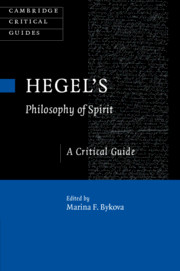Book contents
- Hegel’s Philosophy of Spirit
- Cambridge Critical Guides
- Hegel’s Philosophy of Spirit
- Copyright page
- Contents
- Contributors
- Acknowledgments
- Abbreviations
- Introduction
- Part I Philosophy of Spirit and Hegel’s Philosophical System
- Part II Philosophy of Subjective Spirit
- Part III Philosophy of Objective Spirit
- Chapter 6 The Idea of a Speculative Philosophy of Objective Spirit
- Chapter 7 Objective Spirit
- Chapter 8 On Hegel’s Account of Selfhood and Human Sociality
- Chapter 9 Hegel’s Idea of the State
- Part IV Philosophy of Absolute Spirit
- Bibliography
- Index
- Cambridge Critical Guides
Chapter 7 - Objective Spirit
The Pulse of Self-Consciousness
from Part III - Philosophy of Objective Spirit
Published online by Cambridge University Press: 24 June 2019
- Hegel’s Philosophy of Spirit
- Cambridge Critical Guides
- Hegel’s Philosophy of Spirit
- Copyright page
- Contents
- Contributors
- Acknowledgments
- Abbreviations
- Introduction
- Part I Philosophy of Spirit and Hegel’s Philosophical System
- Part II Philosophy of Subjective Spirit
- Part III Philosophy of Objective Spirit
- Chapter 6 The Idea of a Speculative Philosophy of Objective Spirit
- Chapter 7 Objective Spirit
- Chapter 8 On Hegel’s Account of Selfhood and Human Sociality
- Chapter 9 Hegel’s Idea of the State
- Part IV Philosophy of Absolute Spirit
- Bibliography
- Index
- Cambridge Critical Guides
Summary
One of the issues facing any account of Hegel’s conception of “objective spirit” (in which more or less his ethical and political philosophies are enclosed) is the fact that opinion is so divided as to what objective spirit really is. The oldest narrative is that it concerns the dialectical logical-metaphysical development of a kind of cosmic mind-spirit that culminates in an ethnic nation-state. This type of interpretation began with the hugely influential book by Heinrich Moritz Chalybäus – who initiated the erroneous idea that Hegel’s dialectic is the lockstep movement of thesis–antithesis–synthesis – and continues in more sophisticated ways in contemporary literature.1 Another approach, much more recent, is roughly analytical, sometimes pragmatist, and sometimes very generally in line with Frankfurt critical theory, which looks at Hegel’s arguments for various positions and how they stand independently of Hegel’s own commitments to any so-called dialectical logic.2 There are also attempts to view Hegel’s political philosophy not in terms of cosmic Geist but as a post-Kantian investigation into, more or less, the demands of practical reason, the “sociality of reason.” There is also an emerging debate on where to place Hegel in the current disputes about “naturalism,” to put it in its most general terms.3 Add to that the disputes about whether Hegel’s political theory is best described as liberal, authoritarian, fascistically inclined, communitarian, proto-communist, bourgeois, modernist, or anti-modernist; whether it has a place for “individuality” or is opposed to it; and so on. Moreover, this list of options is not exhaustive.
- Type
- Chapter
- Information
- Hegel's Philosophy of SpiritA Critical Guide, pp. 147 - 163Publisher: Cambridge University PressPrint publication year: 2019
- 2
- Cited by

